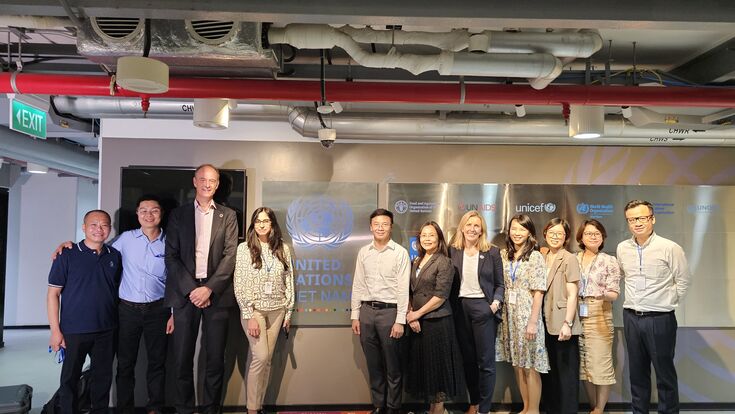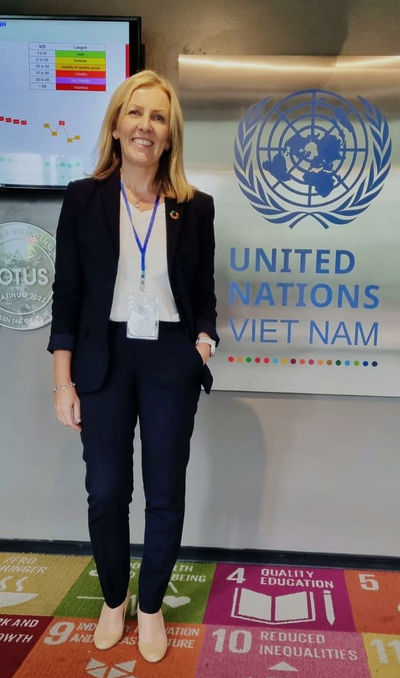Plastic Pollution : TOMRA CEO joins panel discussion on UN Global Plastics Treaty in Vietnam

Millions of tonnes of plastic leave the recycling system every year. Vietnam is no exception. According to a new report by the International Finance Corporation (IFC) and the World Bank, the Southeast Asian country wastes nearly US$3 billion worth of recyclable plastics each year due to a lack of waste management infrastructure. Of the 3.9 million tonnes of PET and polyolefins (PO) produced in Vietnam, only 33% is collected for recycling. As global warming becomes more apparent and plastic production and pollution increase rapidly, Vietnam is taking action to tackle plastic pollution and mitigate climate change. The country has set ambitious targets, including a 50% reduction in plastic waste entering the ocean by 2025, the introduction of Extended Producer Responsibility (EPR) policies, and the formalisation of the informal waste sector. In response to Vietnam's commitment to the cause, it has been invited to become a member of the High Ambition Coalition (HAC) to support the implementation of the Paris Agreement.
Plastic pollution and its consequences are not a regional challenge. It has a global impact. To end plastic pollution, UN member states have committed to developing an agreement to end the loss of plastic waste. First discussed in Nairobi in March 2022, the UN Treaty on Plastic Pollution has the power to catalyse the rapid implementation of waste management and recycling systems, address the plastic pollution crisis at scale, and pave the way for a circular economy for plastics.
To realise the country's ambitions and explore the UN Global Plastics Treaty with industry experts, the National Plastic Action Partnership (NPAP), together with the United Nations Development Programme (UNDP), convened the NPAP Plastic Talk on 28 August in Ha Noi, Vietnam. The NPAP is a platform that brings together governments and other key stakeholders to take action on plastic waste and pollution. The hybrid event is seen as one of the measures Vietnam is taking to move forward in its fight against plastic pollution. Hosted by UNDP and NPAP, the conference focused on “How can business contribute to a Global Plastics Treaty.”
Topics on the agenda included: discussions on the different views and contributions of the private sector in defining the framework; implementation of the legally binding agreement on plastic pollution; and how the business coalition can foster partnerships in developing an ambitious and effective global plastics treaty. Presenters and panelists also discussed the opportunities and challenges for plastics producers in Vietnam, with more opportunities than challenges.
Discussing waste management in Asia
TOMRA, one of the founding members of the Business Coalition for the Global Plastic Treaty and an industry influencer, was invited to join the Plastic Talks to share its perspective on the Treaty, expertise, and recommendations. During the NPAP, Annupa Ahi, Vice President of Public Affairs at TOMRA Asia, gave a presentation on “The Role of Asian and Vietnamese Enterprises in the UN Plastic Treaty.” TOMRA CEO Tove Andersen also participated in the final panel discussion with representatives from the Ellen MacArthur Foundation, the Norwegian Embassy, the Ministry of Natural Resources and Environment (MONRE), TOMRA, and the Vietnam Plastics Association.
Tove Andersen, CEO and President of TOMRA, explains: “Waste management in Asia is still in its infancy. The region has vast potential and opportunities to bring materials back into the loop. I see that Vietnam is taking on these challenges and is turning them into valuable opportunities for the country and society alike. We at TOMRA appreciate the collaboration we have with Vietnam and are confident that we can leverage our partnerships to help the country implement the necessary infrastructure and technologies to reach its goals. The concepts and technologies exist, but it is up to the countries and the industry to embrace these and make the most out of them.”
Part of the actions Vietnam is taking to tackle plastic pollution include the introduction of an EPR scheme in 2024 and the reduction of greenhouse gas emissions to reach its net zero goals. Vietnam was the first country in Southeast Asia to enact an EPR scheme in 2022. Andersen paid particular attention to how TOMRA supports Vietnam in negotiating the treaty and businesses, pointing out that TOMRA’s close collaborations with the Norwegian Embassy, the Business Coalition, and the NPAP, combined with its advanced technologies for collection and waste sorting, will enable Vietnam to unleash opportunities, collect recyclables, and sort and recycle them into high-quality secondary materials.

“We believe, that TOMRA's Holistic Resource System, which combines existing waste management practices to maximize collection of materials for recycling, has the capability to adapt to location requirements and future needs. It is our mission to enable a world without waste and our priority to welcome opportunities and strategic partnerships to make this happen,” adds Andersen.
In the long term, Vietnam, which has a very traditional approach to waste management, is expected to make a significant change in managing the tonnes of plastics produced, consumed and discarded through a holistic approach that encompasses the entire plastics value chain and addresses the entire life cycle of plastics. It also aims to improve current waste management practices and integrate the informal waste sector into formalised waste management and recycling infrastructures.
Collaboration beyond the UN Global Plastic Treaty
The Ha Noi event was not the first meeting between TOMRA and local industry representatives. Their cooperation began earlier. In February 2023, TOMRA welcomed a high-level delegation from MONRE to its headquarters in Germany and Norway to see the company's state-of-the-art sorting machines for waste recycling and its deposit return system, which achieves collection rates of up to 90% or more for beverage containers, depending on the country. In view of these promising recovery rates, which are crucial to achieving greater circularity in the country and removing valuable recyclables from the environment, TOMRA is working closely with the Norwegian Embassy and MONRE. Joint activities include a proposal for a DRS design for Vietnam and other holistic waste management concepts that will help move the country closer to a circular economy.
Andersen concludes: “I am impressed by Vietnam’s commitment to tackling plastic pollution and glad that TOMRA will be part of their journey to a circular economy. For us, a solution should include advancing current waste management practices and integrating the informal waste sector into a formalized waste management and recycling infrastructure, not only in Vietnam but globally. With each step we take, we are creating a healthier planet and additional jobs.”
After attending the opening of TOMRA's new office in Xiamen, China, and the successful participation in the National Plastic Action Partnership (NPAP) Plastic Talks in Ha Noi, Tove Andersen met with the Minister of MONRE. It was emphasised that TOMRA will continue to work with the Norwegian Embassy to support Vietnam in implementing the EPR system, in transitioning to a circular economy, and in achieving the NetZero goals that Vietnam has committed to at the UN Climate Change Conference of the Parties (COP26).
